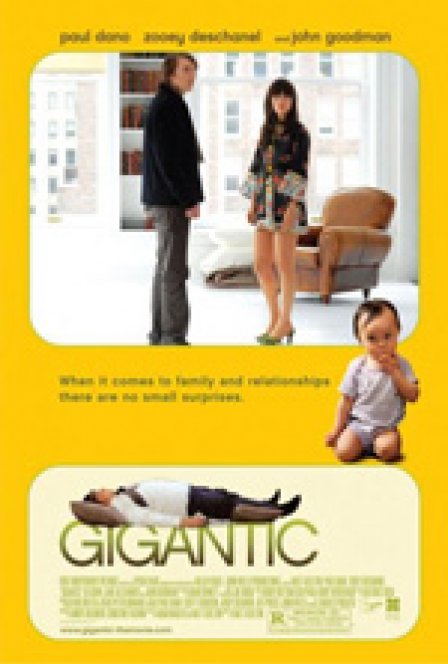Let’s start this off by saying AnCo’s “Did You See The Words” is the exit music for this film. That’s right, Gigantic is that kind of movie. Now that’s out of the way.
Paul Dano was so good in There Will Be Blood. His embodiment of both repression and aggression created an achingly beautiful tour de force that distanced Dano from that earlier, lighter work he’d committed to film. This just makes it that much more heartbreaking to watch him channel Dwayne from Little Miss Sunshine in this uber-quirky mess of a movie. After watching Gigantic, I hoped that maybe Mr. Dano read a completely different draft of the script and then was hoodwinked into serving as a focal contrast to Zooey Deschanel’s quivering fawn in the forest, the both of them victims of a cruel joke by Wes Anderson’s evil, mentally defective twin. But Dano helped produce Gigantic, a painfully safe indie-darling that’ll surely take its rightful pride-of-place one fine day on IFC weeknights @ 2AM.
Dano, who distinguishes himself here by going out of his way to make his face look dumb, plays Brian Weathersby, a mattress salesman in New York and the least successful son in a family of eccentric assholes. Because he’s totally compassionate, he wants to adopt a Chinese baby, natch — this allows for the maximum of stale and repugnant AZN jokes, which are liberally peppered throughout the film. I suppose it’s not racist to deeply insult someone’s culture as long you’re totally random and zany and want to adopt their babies for no apparent reason. Anyway, while working at the mattress showroom, Dano encounters a horribly overwrought John Goodman, who wastes his talents portraying unlovable racist named Al Lolly, who has back problems and needs a new bed. After telling Dano not to “Jew up” the price on a $14,000 mattress, Al cracks a joke about how his assistant is gay and summarily exits.
Later that afternoon, Happy (Deschanel) shows up and — wouldn’t you know it — falls asleep on one of the mattresses in the shop. It’s so cute when Dano tells her it's okay to sleep in his store, and then gets her a blanket and looks deeply into... Oh, why even bother finishing that sentence? This movie is stupid, and that cutesy bullshit isn’t even the worst part. Zach Galifianakis, playing a homeless man, serves as some sort of ham-fisted metaphor for Dano’s inability to own his life or some shit. Sometimes, apropos of nothing, Galifianakis will show up and kick the shit out of Brian. At first, it appears that these encounters only happen at crucial points in Brian’s life, when a tough decision is going to have to be made. But that might make too much sense. As the film progresses, Galifianakis just shows up, randomly, to pound on Dano every once in a while.
If it weren’t for the “meaningful” dialogue, I might start to think that Gigantic was an amazingly meta statement about the essential foolishness of romantic films, but then Dano and Deschanel start waxing philosophical about Rimpoches playing basketball with ad executives. And then I’m left wondering who made the call to leave that tasty tidbit of meaningless chatter in the final cut.
As for the film's technical merits, well, you remember in high school when you read somewhere that photographs are always more tasteful and arty if the subject is not in the center of the frame? Yeah, so does everyone else. There is hardly a shot in Gigantic where one of the characters is not halfway out of frame. Maybe this is supposed to be “meaningful,” but it ends up being consummately annoying. I was left wondering why the filmmakers didn’t just double-expose every scene and call it a day.
The film's co-writer and director Matt Aselton has made only one other contribution to American cinema: He was as an executive producer for Dr. Bronner’s Magic Soapbox, a documentary about Dr. Emmanuel Bronner, the nutjob who made that sweet, all-natural Zoroastrian soap I used to sell when I worked at Whole Foods in Ann Arbor. And it seems that, like the shoppers who frequented my store, Aselton's feature debut takes a fusion-cooking approach to filmmaking. By blending the clichéd indie trope of awkward grown-up children finding themselves (and a little love along the way) with the abstract and clinical detachment of the other half of clichéd indie films, Aselton winds up with a movie that doesn’t have the faintest idea what it is.
There are moments of levity in Gigantic, and even some beauty. But the albatross around the film’s neck is its own conceit, a conceit which, try as the cast might, is impossible to ignore.

